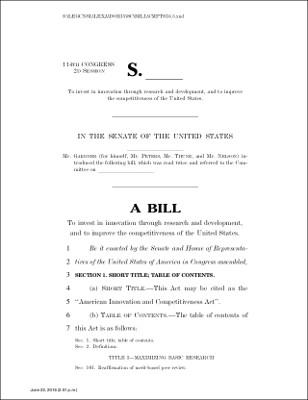The U.S. Senate, under leadership of the Commerce Committee’s innovation and competitiveness working group on federal science and technology research policies, along with the Committee on Commerce, Science, and Transportation, recently introduced the American Innovation and Competitiveness Act. The bipartisan bill maximizes basic research by reducing administrative burdens for researchers, enhancing agency oversight, improving research dissemination, and reforming federal science agencies to increase the impact of taxpayer-funded research.
The proposed bill most directly affects programs within the National Science Foundation (NSF), National Institute of Standards and Technology (NIST), and the White House Office of Science and Technology Policy (OSTP), and follows months of roundtable discussions, an open comment period, and bipartisan deliberations.
Highlights of the American Innovation and Competitiveness Act include:
Maximizing Basic Research
- Peer review – Reaffirms the NSF’s merit-based peer review process for determining grants.
- Broadening research opportunities – Updates and renames NSF’s Experimental Program to Stimulate Competitive Research (EPSCoR) for underutilized regions to reflect its established record.
- Cybersecurity research – Directs research to help better protect computer systems from cyber threats.
- Transparency and accountability – Codifies reforms to increase transparency and accountability in the National Science Foundation (NSF) grantmaking process.
- Oversight implementation – Requires NSF to address concerns about waste and abuse by improving oversight of large research facility construction, updates a conflicts of interest policy, and reforms management of the Antarctic research program.
Reducing Regulatory Burdens
- Interagency working group – Establishes an Office of Management and Budget (OMB) and OSTP-led interagency working group to reduce administrative burdens on federally-funded researchers.
- Obsolete reporting requirements – Repeals obsolete federal agency reporting requirements as well as previous authorizations for programs that have not been implemented.
Science, Technology, Engineering, Mathematics (STEM) Education
- Outside advisory panel – Authorizes a STEM education advisory panel of outside experts to help guide federal STEM education program decision making.
- Expands opportunities for women – Expands NSF grant programs to increase participation and expand STEM opportunities to women and other under-represented groups.
Manufacturing, Commercialization, and Leveraging the Private Sector
- Crowdsourcing Science – Expands opportunities for crowdsourcing research input and citizen science participation by organizations and individuals.
- Manufacturing – Updates NIST’s Hollings Manufacturing Extension Partnership (MEP) Program for small and medium sized businesses by adjusting the federal cost-share requirement and implementing new accountability and oversight requirements.
- Promoting entrepreneurship – Authorizes and expands NSF’s Innovation Corps program to promote entrepreneurship and commercialization education, training, and mentoring of federally-funded researchers.
- Commercialization grants – Authorizes and expands grants to promote the commercialization of federally-funded research.

